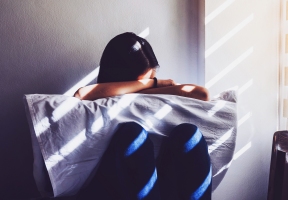

The number of people searching online for topics that are related to boredom, loneliness, and worry rose sharply at the beginning of the first lockdown, a new study shows. Experts examined Google Trends data from 10 countries across Europe and the United States and found search patterns suggested lockdown had “severely affected” mental health.
They tracked how often people searched Google for terms such as panic, divorce, suicide, boredom and wellbeing. When compared to the same period in 2019, the number of searches in Europe at the time of the lockdown in 2020 for boredom rose by 93%, loneliness 40%, and worry 27%. In America, the number of searches at the time of the lockdown in 2020 for boredom rose by 57%, loneliness by 16%, and worry by 12%.
Researchers found results were similar whether countries, states, or cities went into full or partial lockdown, suggesting that any form of restrictions had a substantial impact on wellbeing.
Nattavudh Powdthavee, Professor of Behavioural Science at Warwick Business School, is one of the authors of the paper and specialises in the economics of wellbeing. He said: “Our findings indicate that people’s mental health may have been severely affected by the pandemic and lockdown.
“There was a substantial increase in searches for boredom, loneliness, and worry. However, we did see a significant drop in searches for suicide, divorce, and stress.
“It may be necessary to make sure support is provided to help those struggling most with lockdown.”
The research by economists from the University of Ottawa, Warwick Business School, Paris School of Economics, and Aix-Marseille was published in the paper COVID-19, lockdowns and well-being: Evidence from Google Trends in the Journal of Public Economics.
Researchers analysed Google search data from the United Kingdom, United States, Ireland, Austria, Belgium, France, Italy, Luxembourg, Portugal, and Spain between January 2019 and April 2020.
That allowed them to compare how often people searched for 13 key terms just before lockdown, after they were ordered to stay home, and during the same period 12 months earlier.
Professor Abel Brodeur from the University of Ottawa said: “We did see the number of searches for sadness revert towards the norm, perhaps reflecting hopes that lockdown would be relatively short-lived. “However, the effects on boredom and worry have not dissipated over time and this snapshot of wellbeing in the firsOt weeks of lockdown does not account potential fatigue as individuals grow increasingly tired of self-regulating as time passes.
“It is a reminder that, while the economic cost of the pandemic and lockdown is considerable, there are other potential costs in terms of trust, disruption to schooling, and wellbeing. “That is particularly relevant as many countries are going through a second wave of the pandemic and are facing fresh restrictions.”









